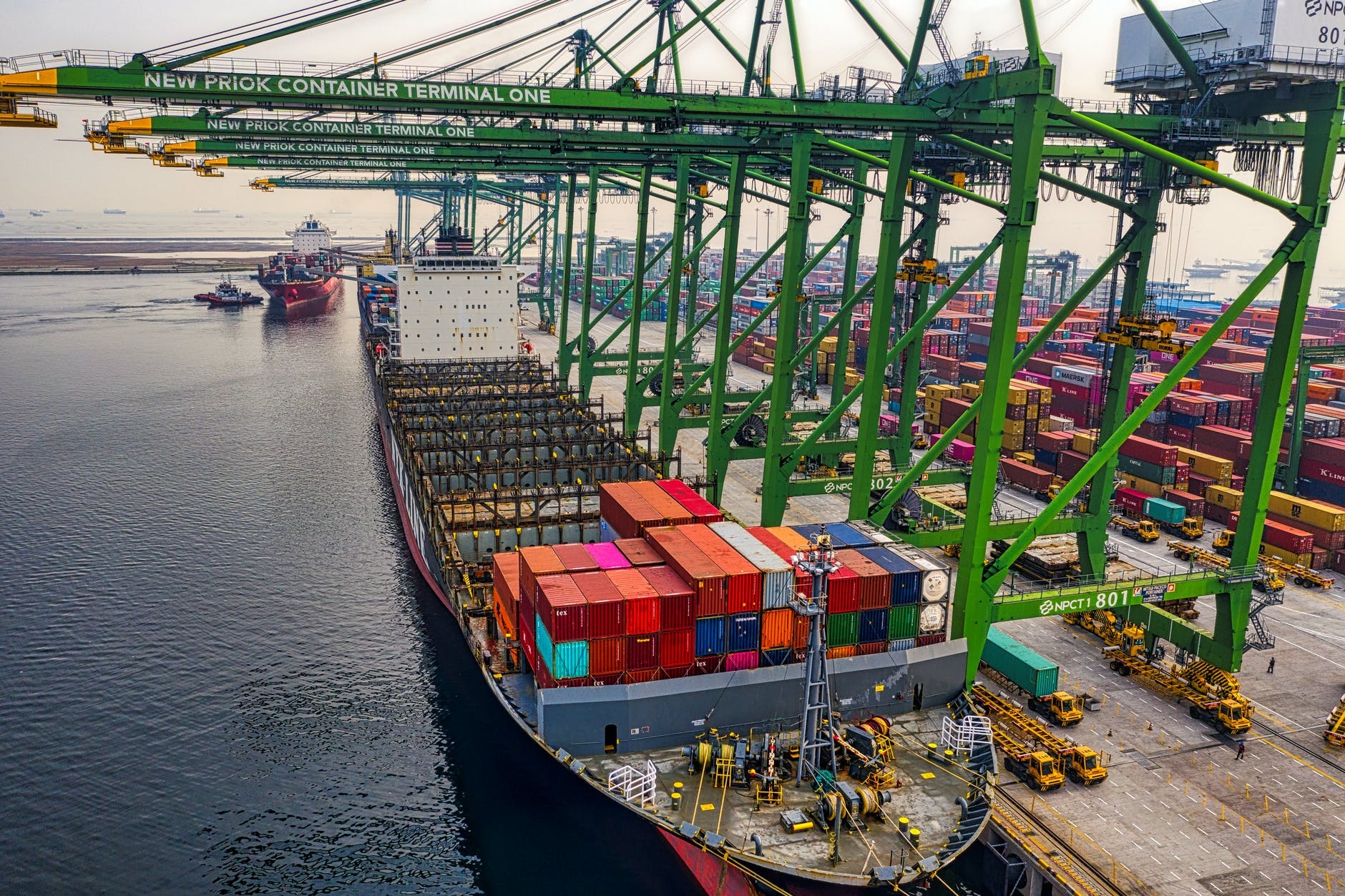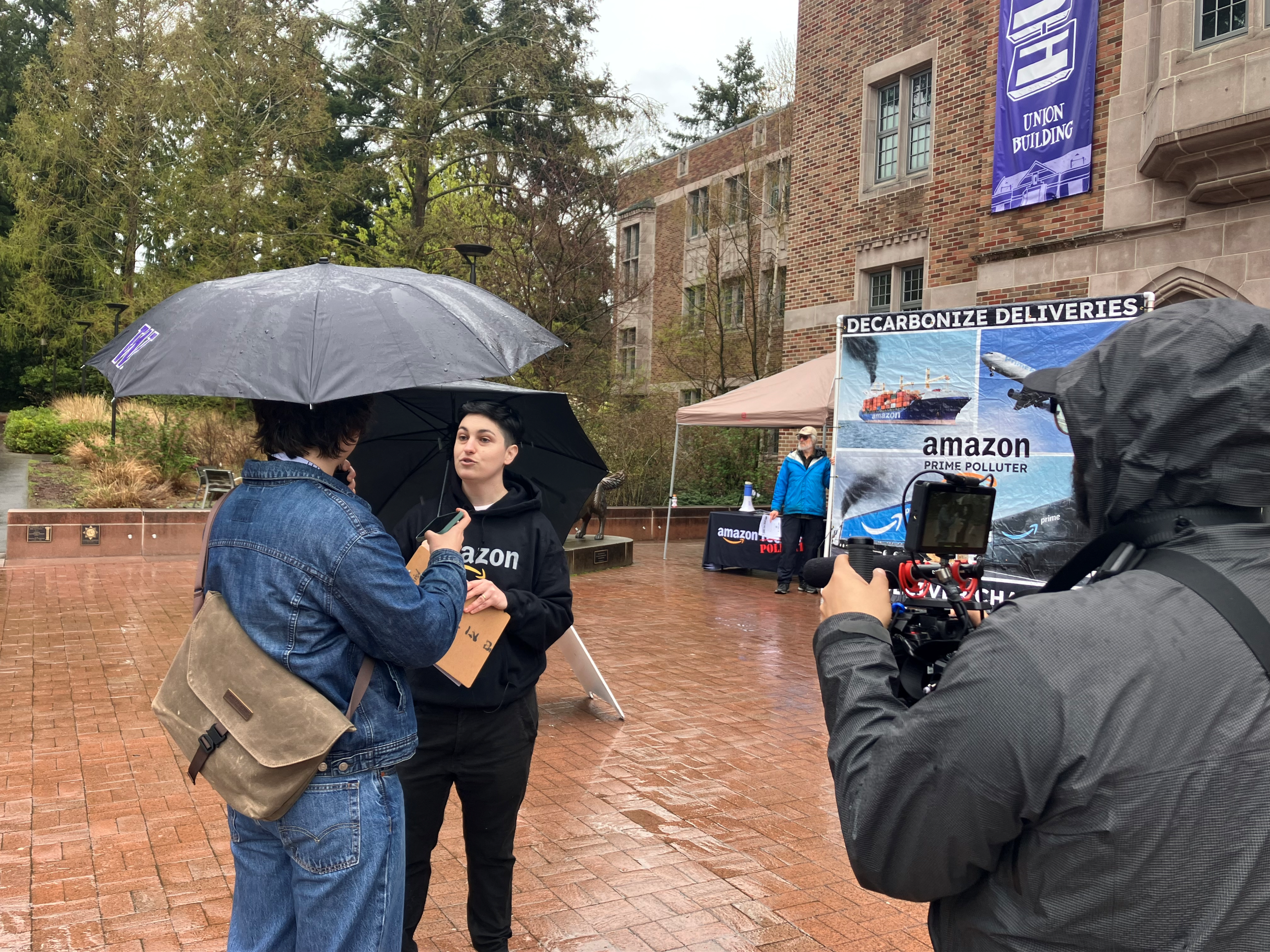


LONG BEACH, CALIFORNIA — On Earth Day, more than 100 climate activists with the Ship It Zero coalition gathered in three West Coast port cities to protest retail giant Target’s role in climate change, highlighting the company’s outsized role in ocean shipping pollution and the impacts on climate, oceans, and the health of port communities locally and worldwide.
The protests came on the same day U.S. President Biden visited Seattle to address infrastructure, clean energy, forest protection, and wildfire resilience. Ahead of his visit, the Ship It Zero called on the president to prioritize a green shipping corridor between Seattle and Busan, and welcomed his announcement made late Thursday at the Our Ocean Conference to provide additional funding to zero-emissions shipping and establish a framework for green shipping corridors through the Mission Innovation initiative.
The events also happened on the same day Long Beach City Council introduced a resolution through its Climate Action and Environmental Committee calling on major retail companies to adopt zero-emissions shipping by 2030, following in the footsteps of a similar move by the Los Angeles City Council last year.
In Long Beach, almost 50 college and high school students, environmental and social justice advocacy groups, and faith community members marched from California State University Long Beach to Target’s nearby store, where they held an 8-minute “die in” that represented the 8 years of lower life expectancy for the people living in port-adjacent communities.
In Seattle, more than 100 climate activists lined the street for Biden’s speech at Seward Park, including some holding signs of the president wearing a “Ship It Zero” pilot’s hat and citing his statement that “climate change is the existential threat to humanity.” In Bellingham, a handful of youth activists and their parents planned to hold an 8-minute “die in” outside Target’s local store later in the day. See photos & videos from all the events.
According to Ship It Zero coalition reports Shady Ships and Shady Routes, Target is a top retail importer into the U.S. and a top contributor to the ship pollution and congestion crisis at the West Coast ports. The ocean shipping industry currently relies on one of the dirtiest fossil fuels to power its ships: heavy fuel oil, a toxin-laden, tar-like substance that, when burned, emits significant levels of asthma and cancer-causing air pollutants.
Overall, 95% of Target’s imports pass through the West Coast. From 2018-2020, Target’s fossil fueled ships emitted 6.4 million tons of carbon dioxide to ship an estimated 1.8 million twenty-foot equivalent units (TEUs), with 727,146 TEUs passing through the ports of Los Angeles and Long Beach, and 403,686 TEUs passing through the Port of Seattle, during that time.
QUOTES FROM SHIP IT ZERO COALITION
“Target’s reliance on the dirtiest fuel in the market for its ocean shipping is poisoning the retailer’s Long Beach and Los Angeles customers,” said Dawny’all Heydari, Lead of the Ship It Zero Campaign at Pacific Environment. “We call on Target to be a good neighbor here in Southern California and commit to 100% zero-emissions ocean shipping this decade, within months, as the IPCC projects that it is ‘now or never’ in order to avert catastrophic climate scenarios. We are the heroes we have been waiting for: the time for Target to step into the twenty-first century has arrived.”
“Target imports its goods on cargo ships fueled with some of the dirtiest fossil fuels on Earth, which pollutes our oceans and our climate, and causes serious health impacts for people living in nearby port communities. While its competitors, Amazon and IKEA, have taken steps to tackle their ocean shipping pollution, Target has so far remained silent. It’s past time for Target, as one of America’s top importers, to become a leader on zero-emissions shipping,” said Kendra Ulrich, Shipping Campaigns Director and Lead of the Ship It Zero Campaign at Stand.earth.
QUOTES FROM LONG BEACH CITY COUNCIL MEMBERS
“What happens out at sea hardly gets the attention it needs, but every day from downtown Long Beach we see the brown haze stretch out over the ocean from ships burning heavy oil at sea and diesel offshore. Reducing transoceanic shipping emissions is vital to addressing climate change and air quality both globally and locally,” said Cindy Allen, Long Beach City Council Member, District 2. “Green shipping corridors are an important first step, and a key part of the holistic solution that also involves legislative advocacy to fund and implement zero emission technologies alongside bridge technologies like emissions capture to clean up our air today. As the new zero-emission solutions are aggressively rolled out, we need companies with major shipping footprints to lead the way and ship their goods using only the best available technologies.”
“A hub for international trade, Long Beach and its residents face significant impacts from cargo ship pollutants,” said Al Austin II, Long Beach City Council Member, District 8. “As cleaner, emission-friendly technology becomes more available, I think it’s necessary for the city and those who utilize our port to take every feasible step to curb airborne emissions wherever possible.”
QUOTES FROM LONG BEACH EARTH DAY PARTICIPANTS
“Target CEO Brian Cornell owes it to the younger generations to ensure a livable future for those to come. We’re not asking for anything but breathable air here in Long Beach,” said Diana Michelson, Founder of the Long Beach Green Schools Campaign and a Long Beach high school student. “When Target places its record corporate profits during the pandemic over human life, we know it’s time to act.”
“East Yard is participating in an action with the CSULB Environmental Science and Policy Club, Pacific Environment, and other groups to call attention to end shipping pollution this Earth Day. Our members, Maria Reyes and Kimberly Amaya, will speak about the impacts of shipping pollution and the massive goods movement infrastructure that plagues frontline Black and brown working class communities like West Long Beach,” said Jan Victor Andasan, Community Organizer with East Yard Communities for Environmental Justice. “While this action is taking place in East Long Beach, our members are here because it is our communities that are the air filters to other neighborhoods situated farther away from the goods movement complex that benefits companies like Target that makes billions off of harming our bodies with contamination.”
“Our congregation strives to nurture our beloved community here in Long Beach, where our Earth and all of her creation can thrive. Our commitment to earth justice leads us to stand against environmental racism by transforming unjust systems by addressing damaging policies and toxic practices,” said Reverend Lissa Gundlach, Minister of the Unitarian Universalist Church of Long Beach. “We know that Target thinks of itself as a socially responsible corporation, but we are very concerned about the environmental impact of Target’s excessive pollution, particularly on low income communities of color in West Long Beach. We call on Target to be a steward of our earth, and a good neighbor, by making a commitment to ending shipping pollution now.”
“It is time that Target ends its fossil-fueled ocean shipping pollution in Long Beach and transitions to 100% zero-emissions technologies,” said Fatima Iqbal-Zubair, candidate for California State Assembly, 65th District. “It is time to end profiteering of large corporations and prioritize the health of Long Beach and surrounding communities — frontline communities that have lived for too long with the impacts of ship pollution and environmental injustice.”
“Target is a major contributor to the pandemic-era ship congestion crisis and resulting air pollution here in Long Beach. The retailer’s reliance on heavy fuel oil in its ocean shipping has a real effect on our health, and will impact us not only now but for years to come: life expectancy in Long Beach port-adjacent communities is eight years lower than the Los Angeles County average,” said Jayden Maree, President of CSULB’s Climate Action Team Club. “It is pertinent for our neighbors’ health that Target acknowledges its power and commits to zero-pollution shipping corridors now.”
“As we race towards a just and sustainable society, ship pollution and its health effects have no place in our communities,” said Cristal Castro, President of CSULB’s Environmental Science and Policy Club. “We call on Target to be an example for other companies to take the right step and end ship pollution.”
LONG BEACH & SEATTLE PORT IMPACTS
The Los Angeles area receives 40% of all containerized cargo imports to the U.S. coming through the ports of Los Angeles and Long Beach, making the surrounding communities — primarily working-class communities of color — particularly vulnerable to harmful pollutants. Port-adjacent communities experience up to eight years lower life expectancy than the Los Angeles County average, and the highest risk of cancer regionally.
During the pandemic, port pollution has skyrocketed. According to the California Air Resources Board, in 2021, fossil-fueled cargo ship congestion at the ports of Los Angeles and Long Beach caused an increase in nitrogen oxide (NOx) emissions equivalent to adding 5.8 million passenger cars to the region, and an increase in particulate matter (PM) emissions equivalent to 100,000 big rig trucks per day. Both pollutants are associated with higher risk of asthma, cancer, and premature death.
A recent UC Berkeley Institute of Governmental Studies poll co-sponsored by the Los Angeles Times found that nearly two-thirds of Los Angeles voters say extreme heat poses a serious threat to their health and safety. Eight in 10 voters say the same about air pollution, which, like climate change, is caused by dirty fossil fuels like heavy fuel oil.
Other West Coast ports also bear a heavy pollution burden from international shipping. According to a 2019 study by the International Council on Clean Transportation, the ports of Seattle/Tacoma and San Francisco have the highest rates in the U.S. of early deaths per 100,000 residents from port pollution, more than double the global average. A 2013 study by Just Health Action and Duwamish River Cleanup Coalition found that life expectancy in Seattle’s port-adjacent neighborhoods of Georgetown and South Park is up to 13 years shorter than wealthier and less diverse parts of the city.
ABOUT SHIP IT ZERO
The Ship It Zero campaign, led by environmental advocacy organizations Stand.earth and Pacific Environment, is calling on some of the nation’s largest maritime importers — including Target, Amazon, IKEA, and Walmart — to transition to 100% zero-emissions cargo shipping vessels by 2030. This goal will ensure the shipping industry does its fair share in helping to keep global warming under 1.5 degrees Celsius, the target scientists say is needed to avoid the worst consequences of the climate crisis.
Target has been notably missing from other industry initiatives joined by retail giants like Amazon, including the coZEV coalition and U.S. President Biden’s First Movers Coalition. Target’s pandemic-era port pollution has been covered in CNN, Business Insider, and NPR.
In December 2021, the Ship It Zero campaign hosted a press conference on Target’s ocean shipping pollution near the company’s headquarters in Minneapolis, featuring three Minneapolis City Council members and two faith leaders.
Learn more at shipitzero.org.
###
Media contacts:
Gwen Dobbs, Pacific Environment, gdobbs@pacificenvironment.org, 202-329-9295 (ET)
Virginia Cleaveland, Stand.earth, media@stand.earth, +1 510 858 9902 (PT)

Recent Updates





